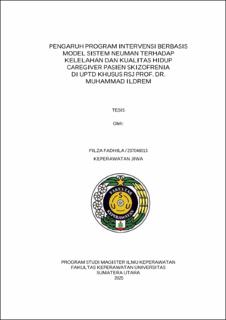Pengaruh Program Intervensi Berbasis Model Sistem Neuman terhadap Kelelahan dan Kualitas Hidup Caregiver Pasien Skizofrenia di UPTD Khusus RSJ Prof. Dr. Muhammad Ildrem
The Effect of an Intervention Program Based on the Neuman Systems Model on Fatigue and Quality of Life of Caregivers of Shizophrenia Patients at the Special UPTD Mental Hospital Prof. Dr. Muhammad Ildrem

Date
2025Author
Fadhila, Filza
Advisor(s)
Purba, Jenny Marlindawani
Daulay, Wardiyah
Metadata
Show full item recordAbstract
Schizophrenia is a chronic mental disorder that requires long-term treatment and care. This condition places a high physical, psychological, and social burden on caregivers, increasing the risk of fatigue and decreased quality of life. An intervention based on the Neuman Systems Model uses a holistic and comprehensive approach. This study aimed to examine the effect of an intervention program based on the Neuman Systems Model on fatigue and quality of life among caregivers of schizophrenia patients at the Special UPTD Mental Hospital Prof. Dr. Muhammad Ildrem. This research employed a quasi-experimental design with pre-test and post-test in both the intervention and control groups. The instruments used included a demographic data questionnaire, the Maslach Burnout Inventory (MBI) to measure fatigue, and the Schizophrenia Caregiver Quality of Lie (SCGQoL) to measure quality of life. A total of 76 caregivers were involved and divided into intervention and control groups. The result showed a significant reduction in fatigue scores in the intervention group after receiving the Neuman Systems Model-based program (P < 0.05), with a mean fatigue score of 41.2 before the intervention and 28.6 after. Meanwhile, the caregivers’ quality of life in the intervention group significantly improved (P < 0.05), with a mean quality of life score increasing from 56.8 to 72.3. No significant changes were found in either fatigue or quality of life in the control group. The intervention program based on the Neuman Systems Model was effective in reducing fatigue and improving the quality of life of caregivers of schizophrenia patients. The implementation of this intervention is recommended in psychiatric nursing practice to support caregivers in providing optimal care to family members with schizophrenia.
Collections
- Master Theses [486]
